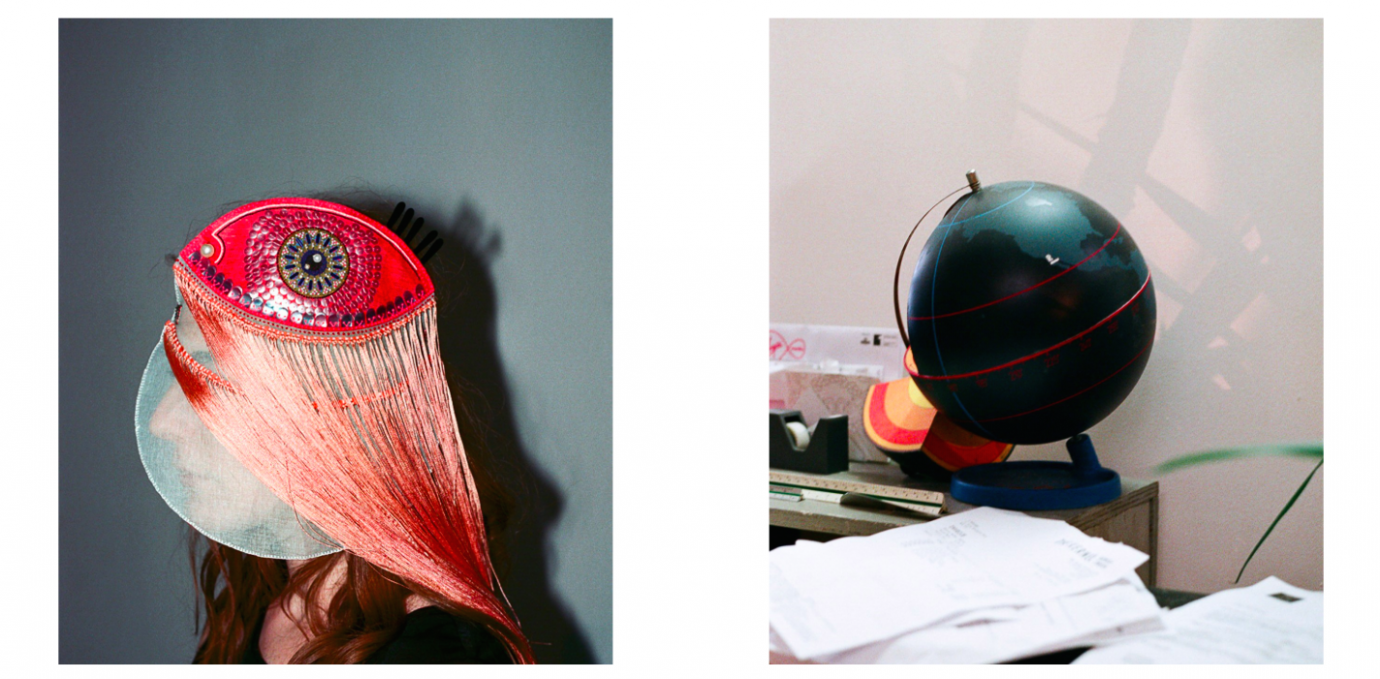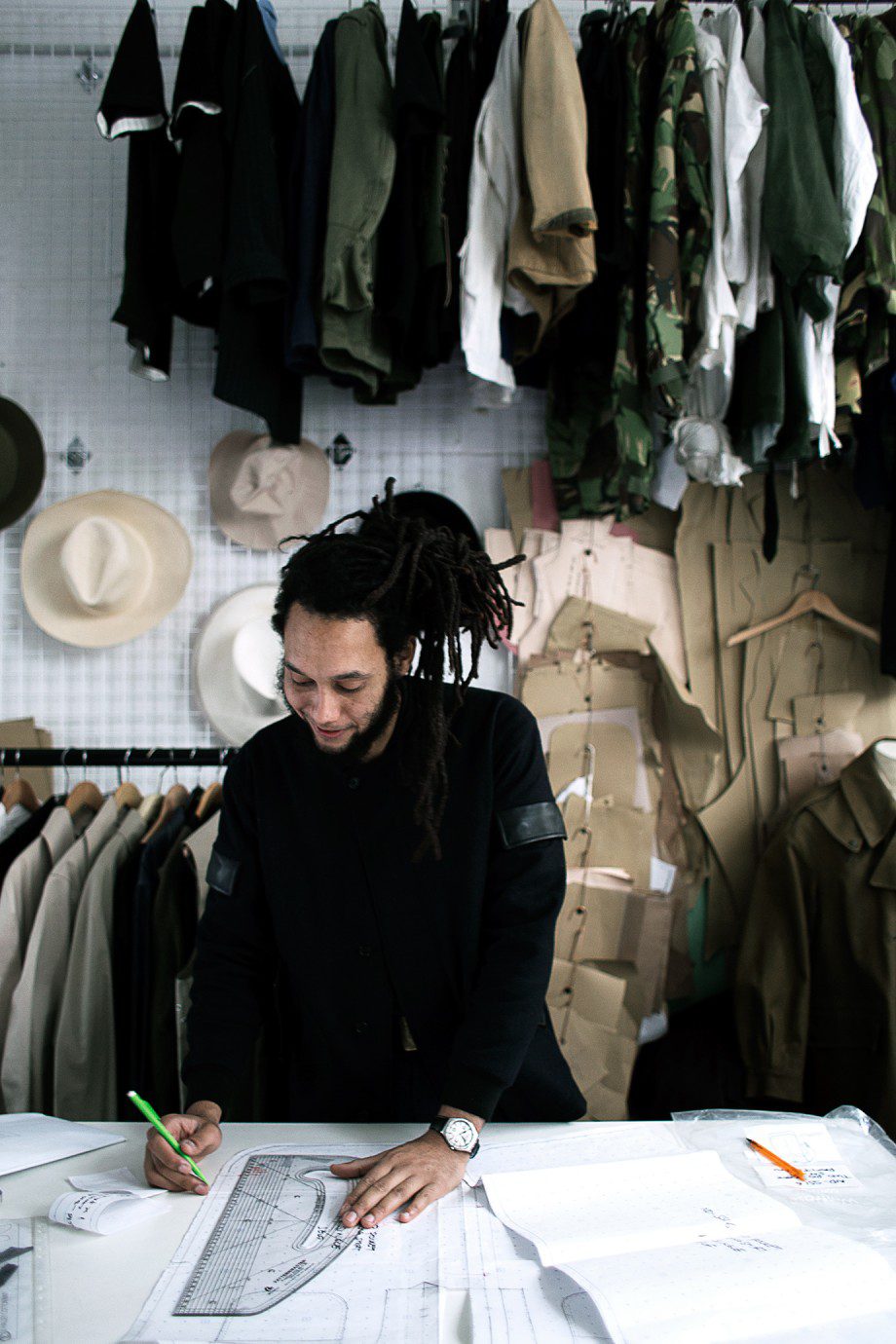This interview is part of DREAMERS, a collaborative project with MCQ that couples aspiring artists to their heroes for a one-on-one advice session. The conversations are recorded, redacted, and can be read in their entirety on my.mcq.com.
Wednesday 26 May 2021, 10am NYC time
Shykira Teague: Could you talk a little bit about your background and what you’re doing now?
Shanel Campbell: I’m a former fashion professor, and I completed my Fashion MFA from Parsons School of Design. After that, I launched my own brand, and I recently launched my second collection, which is a mix of different ideas, silhouette and colour studies. If I were a musician, I would say that it’s my second mixtape. It’s laying out what things are so that I can hone in on what my design identity is. I’m currently working on my third collection, and I’m in the silhouette study and sketching phases and seeing how to roll that out. I’m trying to be very particular about what things look like moving forward and who I work with, and how I spend and raise money, because that’s a very interesting situation.
“I’ve always kind of been the underdog. So I was like, you know what, let me just do internships because no one’s gonna turn down free labour, right?” – Shanel Campbell
Shykira: I’m really glad to be able to interview you and see you from so many different lenses. I did want to ask you about the very start of your career. What was your first internship experience like and what did you learn during that time?
Shanel: My first internship was after I graduated with my BFA from Philadelphia University. I came back to New York and just applied for internships, because if you come to New York with a degree and it’s not from Parsons, you’re not getting a job within the New York fashion industry. Well, at least that was my experience. I’ve always kind of been the underdog. So I was like, you know what, let me just do internships because no one’s gonna turn down free labour, right? It’s part of the culture and you do learn things that you won’t learn in school. The free labour thing is tricky and I’m hoping there’s a world where everyone gets paid for an internship, but at the end of day, I do love to learn. So even if I could, right now, I would take on an unpaid internship if it’s with a company that I love and respect. That first internship was with a knitwear designer from the UK who was based here. I learned how to refine my skills; because I already had a degree, the sewing skills were there. I was learning things, but I was basically an employee working five days a week from 9am until 7pm. You learn a lot, but at some point, it gets exploitative. There’s good and bad in the fashion industry, and I’m just hoping we find the middle ground where kids can learn, and be in an adult space doing adult things, which is tough, but they’re being paid for it.
“When you’re in the position of being the designer, you understand better why people are so tense and why so many things are as rigid as they are.” – Shanel Campbell
Shykira: I’m glad that you say that because the other thing that I want to ask you was: what did you wish you knew coming into the industry?
Shanel: I didn’t go to design school in New York City, and that’s a whole different beast than my BFA experience. I thought we’re here to make clothes, design, have fun and play around with silhouettes and colour. Instead, my experience was just silently working, feeling there was so much at stake, and investors stopping by. And you’re just like, “okay, these people take their job seriously, but where is the light to this?” I don’t want to be in a fashion environment that feels so heavy because there’s just so much at stake. When you’re in the position of being the designer, you understand better why people are so tense and why so many things are as rigid as they are. I’ve stepped away a bit to just reevaluate what it looks like when you’re just making clothes. The industry is very different from just making a garment.
“If you don’t want to show a season, you don’t have to.” – Shanel Campbell
Shykira: Having your own label, do you try to keep up with seasons?
Shanel: I don’t think seasons are necessary. There’s just certain things that were developed at a different time in fashion that maybe worked back then. And there’s nothing wrong with them, but we have a whole new generation coming in and we can’t keep doing everything in the same way, especially if we want to be more inclusive of people from different socio-economic backgrounds. It’s just about trying to do things your way. If you don’t want to show a season, you don’t have to. But you do have to understand that the ‘seasons’ coincide with when buyers buy things or when certain stylists will be in town for fashion week, so that you can meet and present your collection to them. You just have to know who you are, because then you can understand when to walk away from something and avoid financial, physical, or emotional trauma. If you can’t afford to make certain garments, to show twice a year, make garments with a seamstress or get a pattern maker, then you’re putting that physical toll on yourself. And your career will then hurt you physically. Know yourself, know your spirit, know how you want to do things and take your time before that first presentation. I was getting a lot of advice, like “you have to capitalise on the exposure you’re getting right now.” I wish I could just go back to myself and be like: absolutely not, we’re not doing this yet. We have so many things to work out. We have to go and work out the kinks of emotional things that we’ve experienced before we put out our body of work, because this is our baby. You need to take care of it.
Shykira: What are some of the good things that you take away from having been a teacher and connecting with students?
Shanel: The thing about teaching is that I realised I’m not really an institutional person, and I don’t like telling people what to do. So it becomes a little complicated in that I don’t feel I can fully be myself within that space. I enjoy having quick conversations with people here and there, because I do notice that my former students look to me for certain things, which I appreciate. My dream ultimately is to start an art and fashion based residency in New York City; a post college initiative where you can come and propose a project to work on, and I provide resources. That’s beautiful. And for it to be owned by a Black woman, I think could be super important. I also want it to be something where you could live in or live out, and have space for people who need refuge from abusive home environments. I’ve done live-in art residency before and it was run by a 24-year-old – it’s not the craziest thing to put together. So that’s my ideal knowledge exchange environment, more of a residency than a degree based system. No matter what, I’m making this residency, whether it’s two or five years from now.
“If I had the means, nobody would know who I am, like absolutely not. No one would know my face. No one would know that I’m a Black woman, they wouldn’t know I’m a woman. ” – Shanel Campbell
Shykira: What do you want people to think when they think about ‘Shanel Campbell’?
Shanel: To be honest, the thing that’s hard about coming into this industry without money is that you have to put yourself in a lot of programmes and spaces. You need them to help you get somewhere. If I had the means, nobody would know who I am, like absolutely not. No one would know my face. No one would know that I’m a Black woman, they wouldn’t know I’m a woman. The resistance people have to someone with my skin colour… I think I would be completely behind the scenes. In a perfect world, my look or my genitals has nothing to do with my career. But in this world, it has a huge impact on my finances, how long it takes me to get something done. I’m still competing with people who are not as good but maybe have a penis or they’re white.
Shykira: Mediocre! And allowed the space to explore and not be in a box, and just allowed to exist as is. That’s real, but that’s why things are gonna hit harder. Like, “I really had to overcome a lot to get these things, it’s bittersweet, but it’s gonna feel just right.”
Shanel: I’m thinking that maybe I’m the person who’s supposed to go through what I go through, so that I could have conversations with people. I’m not as angry as I used to be in this industry, because that’s just not the emotion to have, you will destroy yourself. There’s a lot to be upset about, so it’s better to just be kind of grounded and more in a neutral space. You still talk about your stuff, right? You still talk about the facts of what things are and how they feel to you, but you do that in a way where you’re not losing yourself in anger or pain. Because it manifests in the physical, you start looking older, you start getting stressed. So yeah, back to your old thing: I would be invisible, nobody would know who I am. I don’t care how people perceive things, because you’re not going to get everybody. I love you, and you care about my work and I appreciate that. You and all your homies they’re supporting, but you’re not always even not gonna hit everybody the same way, it’s impossible. Someone’s either not going to care about you at all, or they’re gonna have negative opinions, or they’re gonna have positive opinions. It is what it is.
Skyria: For sure. Do you have any last notes that you would like to share with the world?
Shanel: We need more Black American women in luxury fashion, enough is enough! Y’all got the dudes and give them support – support the gals.
Interested in learning more? You can find all the interviews from the DREAMER series here.









